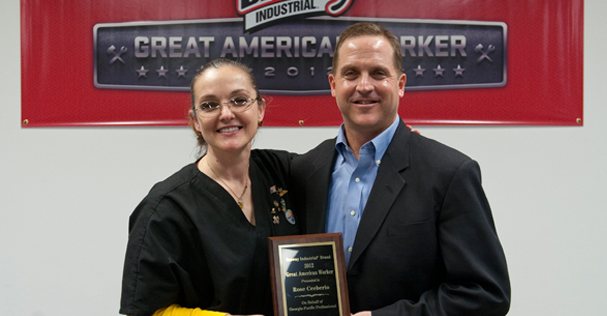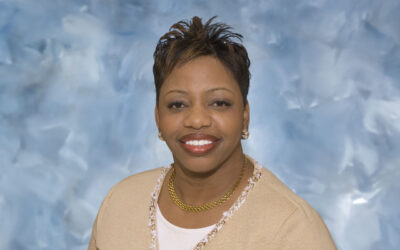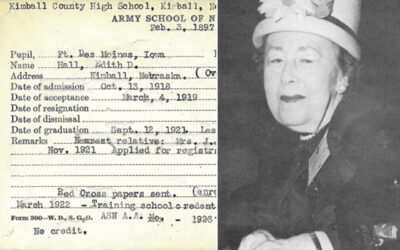Brooklyn-born rose Cceberio remembers, in grisly detail, the moment when she knew she would become a nurse.
She was 15 years old. Her younger sister was playing on a rope swing in the backyard of the family home, which was situated at the top of a sandy hill by a creek. The family dog, a pit bull, was outside with her.
Pit bulls have a particular affinity for the game of tug-of-for, Cceberio says. “They basically jump on ropes, hang on them, and wriggle them to death,” Cceberio says.
All of a sudden, she recalls, her sister “got scared and didn’t jump down.” The dog, in jumping to grab the rope, missed, and accidentally tore away a huge chunk of the little girl’s calf muscle from her leg.
“I know my dog,” Cceberio says. “He really didn’t mean to do that, because the minute she dropped down from the rope, you could tell he was so excited and didn’t know what’s wrong. He’s looking for who[ever] hurt my sister.”
“All I could do was literally sling her over my shoulder and carry her up to the house,” she says.
Inside there was soap and water and antibiotic ointment, with which Cceberio cleaned the wound. Then, all she could think to do was reattach the skin. The only dressing she had handy “was an old peri-pad and a T-shirt,” she said.
Later, when the paramedics arrived on the scene, one tore down the dressing and asked, “Who did this?” Cceberio was bracing for criticism.
“But I was going to give him a what-for for taking 45 minutes to get there!” she says.
Instead, he told her, “there’s a golden hour” for the reattachment of flesh, and that he wasn’t going to undo the work she’d done to inspect it further.
“I think you saved her leg,” the paramedic told her.
The more she thought about it, Cceberio said, she’d never panicked mid-crisis—“I would get done what needed to get done and then have my panic attack maybe two or three hours later,” she recalls—and that enabled her to do what needed to be done in the moment.
 She’d found her calling that day. Proof that she was drafted into the right profession – maybe by fate – Cceberio was also named the 2012 Brawny Industrial Great American Worker. How did that happen? Partly by entering an online essay contest—but partly because her entry was informed by years of experience in the field:
She’d found her calling that day. Proof that she was drafted into the right profession – maybe by fate – Cceberio was also named the 2012 Brawny Industrial Great American Worker. How did that happen? Partly by entering an online essay contest—but partly because her entry was informed by years of experience in the field:
“There is not one profession on this planet that has not involved the services of a nurse,” Cceberio wrote, “We are the ones that are there when new life emerges, crisis happens, and when you pass on to the great beyond.”
From postpartum to cardiac care, from private duty to home hospice, Cceberio has experienced a wide-ranging dynamic of care— partly because she didn’t want to be freaked out if she were plucked out of one unit as a replacement for another, but partly because she wanted to expand her own knowledge base.
“I’m basically plug-and-play,” she says.
Along with that versatility, however, comes the danger that management will assume you’re “basically considered part of the furniture,” Cceberio says. That mindset is behind a lot of workplace strain in the nursing field, she says, and seems particularly unjust in consideration of the instrumental role nurses have played in higherorder specializations.
“When you look at respiratory therapy, and all the other departments, it is a little-known fact, but it is true that nursing started all those specialties,” she says. “The first respiratory therapists were nurses. Then later they became trained to do something totally separate.
Social services again belonged to nursing; that’s where the visiting nurses’ association began.
“Every one of those pieces is now separately charged, except for nursing services,” she said. “So when management needs to do cost-cutting, the first thing they do is labor, and the first thing they do is nursing. We feel devalued, and once that happens, we’re put in situations where there’s danger for our livelihood.”
With the exception of “maybe the last 15 years,” however, Cceberio says, she’s also seen more than her share of starry-eyed young nursing professionals who think they’ll marry a doctor or make lots of money, and wash out or become embittered because they don’t have a true calling for the profession.
“It’s a lot like becoming a nun,” Cceberio says.
She described how “no matter what, you’ll be in the supermarket, minding your own business,” someone in line will collapse, “and ten to one, you’ll see the person that sits with them is a nurse.” That career passion is what angers nurses and makes them feel devalued by management, she says.
“When leadership fails you or the entity that you’re working for prioritizes money over patient care, you’re going to have a crux of people who are very unhappy,” Cceberio says. “What created that environment? It wasn’t a bunch of people coming to work.”
So what’s the solution to driving greater job satisfaction? Starbucks (“60 percent of the customers are nurses,” she says)? Exercise? Family and friends?
“For me it’s a belief that I’m doing something worthwhile,” Cceberio says. “I can work right next to the devil if I have to, but it doesn’t mean he’s going to get me riled up. I’m going to do what I have to do for my patients.”
Nurses are all taught the same thing in school, she says: check your troubles at the door when you walk through it.
“You’re someone else’s hope, someone else’s smile,” she says. “You make a choice as to how you want to feel. Your best bet is to never show your buttons, smile, and do what you have to do. We all have one goal, and that’s for the patient.”
“I love nursing,” Cceberio says. “I am truly scared for its future.”









